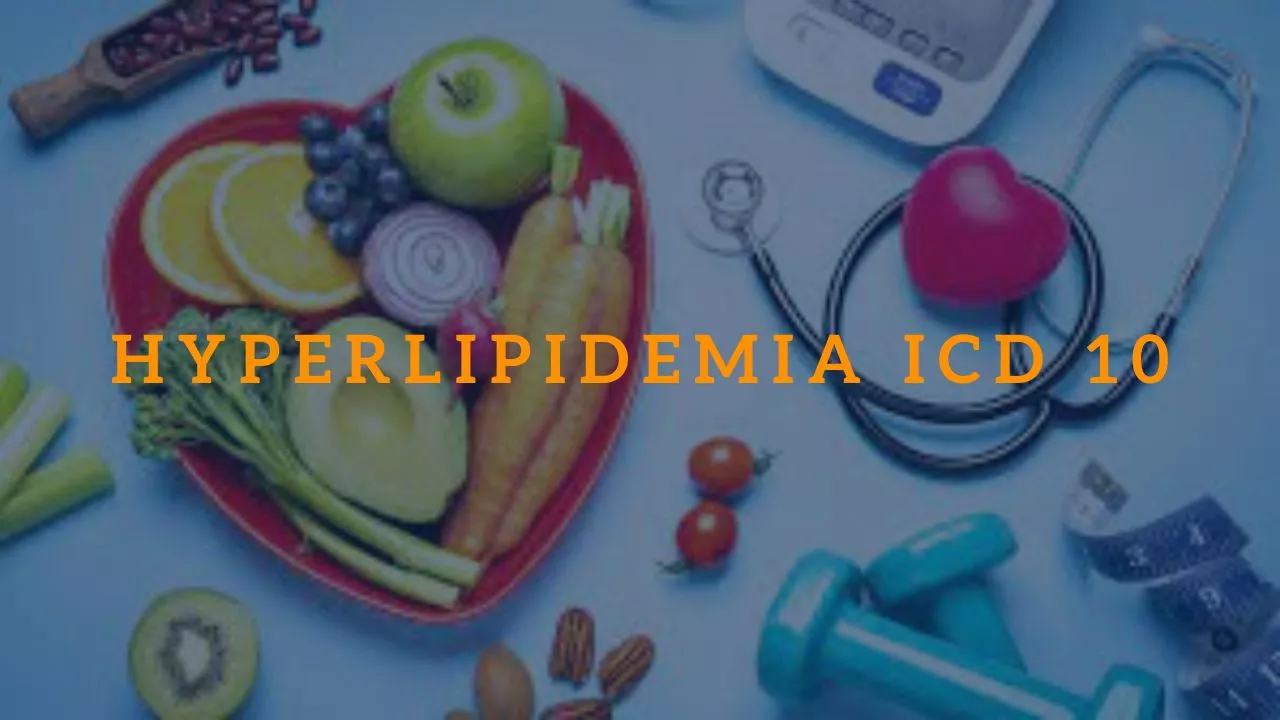Hyperlipidemia is a medical condition that is characterized by high levels of lipids or fats in the blood. This condition can lead to the development of various cardiovascular diseases such as heart attacks and strokes. In order to accurately diagnose and treat hyperlipidemia, medical professionals use a coding system known as ICD 10.

What is ICD 10?
ICD 10 is a coding system used by medical professionals to classify and code various diseases and medical conditions. It is used to track and monitor disease prevalence, morbidity, and mortality rates. The ICD 10 coding system is used worldwide and is regularly updated to include new diseases and medical conditions.
What is Hyperlipidemia ICD 10 Code?
The ICD 10 code for hyperlipidemia is E78. It is classified under the Diseases of the circulatory system category. This code is used by medical professionals to accurately diagnose and treat the condition.
What are the Symptoms of Hyperlipidemia?
Hyperlipidemia is a condition that often has no symptoms. Some people may experience symptoms such as chest pain or shortness of breath if the condition has progressed to a more severe stage.
What are the Causes of Hyperlipidemia?
Hyperlipidemia can be caused by a variety of factors such as genetics, lifestyle choices, and medical conditions. Some of the common causes of hyperlipidemia include obesity, a sedentary lifestyle, high blood pressure, diabetes, and hypothyroidism.
How is Hyperlipidemia Diagnosed?
Hyperlipidemia is diagnosed through a blood test known as a lipid panel. This test measures the levels of various lipids in the blood such as cholesterol and triglycerides. If the levels of these lipids are higher than normal, then a diagnosis of hyperlipidemia may be made.
How is Hyperlipidemia Treated?
Hyperlipidemia can be treated through a combination of lifestyle changes and medications. Lifestyle changes such as regular exercise, healthy eating habits, and weight management can help to reduce the levels of lipids in the blood. Medications such as statins may also be prescribed to help lower lipid levels.
Can Hyperlipidemia be Prevented?
Hyperlipidemia can be prevented through healthy lifestyle choices such as regular physical activity, a healthy diet, maintaining a healthy weight, and avoiding smoking and excessive alcohol consumption.
What are the Complications of Hyperlipidemia?
If left untreated, hyperlipidemia can lead to the development of various complications such as atherosclerosis, heart attacks, strokes, and peripheral artery disease. These complications can be life-threatening and require immediate medical attention.
What is the Prognosis of Hyperlipidemia?
The prognosis for hyperlipidemia is generally good if the condition is diagnosed and treated early. With proper treatment and management, individuals with hyperlipidemia can live a healthy and normal life.
How is Hyperlipidemia Managed?
Hyperlipidemia is managed through a combination of regular monitoring, lifestyle changes, and medications. Regular monitoring of lipid levels can help to ensure that the condition is under control. Lifestyle changes such as healthy eating habits and regular physical activity can help to reduce lipid levels. Medications such as statins can also be prescribed to help lower lipid levels.
What is the Role of Diet in Hyperlipidemia Management?
Diet plays a crucial role in the management of hyperlipidemia. A diet that is low in saturated and trans fats and high in fruits, vegetables, and whole grains can help to reduce lipid levels in the blood. Individuals with hyperlipidemia should also avoid foods that are high in cholesterol such as fatty meats and full-fat dairy products.
What is the Role of Exercise in Hyperlipidemia Management?
Regular exercise can help to reduce lipid levels in the blood and improve overall cardiovascular health. Individuals with hyperlipidemia should aim for at least 30 minutes of moderate-intensity exercise on most days of the week.
How to Lower Cholesterol Naturally?
Lowering cholesterol naturally can be achieved through a combination of healthy lifestyle changes such as regular physical activity, a healthy diet, and weight management. Foods that are high in fiber such as fruits, vegetables, and whole grains can also help to reduce cholesterol levels.
What are the Best Foods for Lowering Cholesterol?
The best foods for lowering cholesterol are those that are high in fiber such as fruits, vegetables, and whole grains. Foods that are high in omega-3 fatty acids such as fatty fish and nuts can also help to reduce cholesterol levels.
What are the Side Effects of Statins?
The side effects of statins can include muscle pain, liver damage, and digestive problems. These side effects are rare and can be managed with proper medical supervision.
What is the Importance of Regular Medical Checkups?
Regular medical checkups are important for the early detection and management of various medical conditions such as hyperlipidemia. Medical professionals can monitor lipid levels and make adjustments to treatment plans as necessary.
What is the Role of Medications in Hyperlipidemia Management?
Medications such as statins can help to lower lipid levels in the blood and reduce the risk of developing complications such as heart attacks and strokes. These medications are generally safe and effective when used under the supervision of a medical professional.
What is the Cost of Hyperlipidemia Treatment?
The cost of hyperlipidemia treatment can vary depending on the severity of the condition and the type of treatment required. In most cases, hyperlipidemia can be managed with lifestyle changes and generic medications which are relatively inexpensive.
Conclusion
Hyperlipidemia is a medical condition that can lead to the development of various cardiovascular diseases such as heart attacks and strokes. The ICD 10 coding system is used by medical professionals to accurately diagnose and treat the condition. Hyperlipidemia can be managed through a combination of lifestyle changes and medications. Regular medical checkups are important for the early detection and management of the condition. By making healthy lifestyle choices, individuals with hyperlipidemia can reduce their risk of developing complications and improve their overall quality of life.
See you again at our other interesting article!
